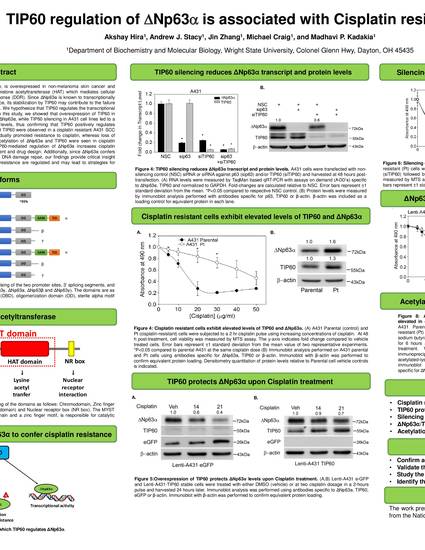
About 5.4 million basal and squamous cell skin cancers are diagnosed every year in the US. ΔNp63a, a member of the p53 transcription factor family, is overexpressed in non-melanoma skin cancer and regulates cell survival, migration and invasion. TIP60 is histone acetyltransferase (HAT) which mediates cellular processes such as transcription and the DNA damage response (DDR). Previous studies in our lab have shown that overexpression of TIP60 induces ΔNp63a protein stabilization in a catalytic-dependent manner. Since ΔNp63a is known to transcriptionally regulate several DDR genes and promote cisplatin resistance, its stabilization by TIP60 may contribute to the failure of platinum-based drugs in squamous cell carcinoma (SCC). We hypothesize that TIP60 regulates the transcriptional activity of ΔNp63a thereby modulating chemoresistance. In this study, we showed that overexpression of TIP60 in both H1299 and A431 cells led to stabilization of ΔNp63α, while TIP60 silencing in A431 cell lines led to a decrease in endogenous ΔNp63α transcript and protein levels, thus confirming that TIP60 positively regulates ΔNp63α in these cell lines. Increased levels of ΔNp63a TIP60 correlated with increased ΔNp63a expression and contributed to cisplatin resistance. Further, stable expression of TIP60 or ΔNp63α individually promoted resistance to cisplatin and reduced cell death, whereas loss of ΔNp63α and TIP60 sensitized cells to cisplatin. Higher acetylation of ΔNp63a and TIP60 were seen cisplatin resistant cells. Taken together, our data suggest that TIP60-mediated stabilization of ΔNp63α increases cisplatin resistance and has potential implications for cancer treatment and drug design. Additionally, since ΔNp63α confers cisplatin resistance through regulation of genes involved in DNA damage repair, our findings provide critical insight into the mechanism by which genes involved in cisplatin resistance are regulated and may lead to strategies for treating resistant tumors with increased efficacy.
Available at: http://works.bepress.com/michael-craig/19/
